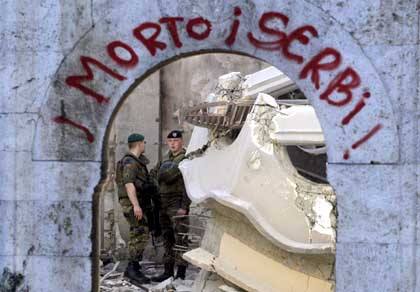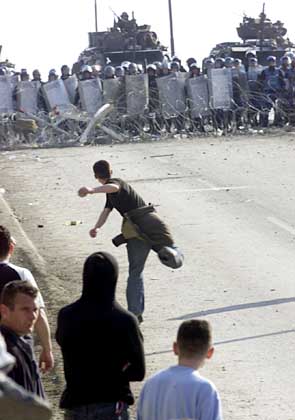To
die for the fatherland
Der Spiegel
- 10 April 2004
Written by: RENATE FLOTTAU, MARION KRASKE
Translation provided by: Nebojsa Malic
In the restive province, Albanians and Serbs are more hostile to each other than ever before. The UN mission of the UN to foster peaceful coexistence has failed miserably – with new solutions nowhere in sight
History is repeating itself: “We will get our freedom – no matter the cost,” it says on the fliers that can be found these days on the windshields of parked cars throughout Kosovo.
Behind this call is a party calling itself the “National movement for the liberation of Kosovo.” Its goal is the unification of the restive province with Albania, its foe the UN administration, UNMIK. Says party chairman Fatmir Humolli: “We will even start a new war for it.”
Humolli believes that UNMIK and KFOR peacekeepers are an obstacle, and must leave. The 4o-year-old, who spent 3 years in prison after helping organize the 1981 Albanian protests, is certain: Overnight, his organization could muster a force of 10,000 fighters akin to the legendary UCK, in which he also fought.
Are these simply fantasies of a nationalist outcast, given the unusual amount of publicity in the Kosovo Albanian media these days?
Probably not. Currently, everywhere in the crisis province warmongers have an easy task. “I will die in the next war in Kosovo,” prophesies proudly Ramush, a UÇK veteran. The 45-year-old has no passport, and his 16-year-old son’s name is in no birth register. “All that I can leave my family,” says Ramush, “is the honor of dying for the fatherland.”
Ramush was at the forefront of the recent violent outbursts against the Serb ethnic minority. He confirms: Of course the unrest was not “spontaneous”. “No Albanian would dare to begin such actions without an order from higher authority,” he says, almost amused.
Meanwhile, EU politicians in Brussels are also certain: the recent uprising of Kosovo Albanians that left 19 people dead, more than 900 injured, 800 houses burned down, and 29 Serbian orthodox churches and monasteries destroyed, was a planned provocation. EU external commissioner Chris Patten is also convinced that prominent Albanian politicians of the crisis province plotted the attacks on Serbs, Roma and KFOR troops.
Physician Sali Butyqi from Musutiste feels no compassion for the Serbian victims of the violent outburst. Like many Albanians, he feels that the fruits of the liberation struggle have been betrayed. He would also be ready to take up arms for the independence of Kosovo once again, unless UNMIK fundamentally changes its delaying policy. After all, Butyqi explains, the UN is here to serve the Albanians, not the other way around.
Five years since the end of the NATO bombing, which stopped the expulsion of Albanians by Serbian soldiers, the hatred between the two ethnic groups runs deep. The Albanians have not yet forgotten the arson and expulsion at the hands of Belgrade’s dictator at the time, Slobodan Milosevic. The fear of living under Belgrade’s authority again some day causes collective panic here – and increasing readiness to resort to violence.
The West has set itself a goal of a multi-ethnic community in Kosovo, which no one there wants – warned recently OSCE Ombudsman Marek Nowicki before the Council of Europe. No one among the Western political leaders ever gave a realistic chance for the return of the Serbs.
Such criticism of the international community’s Kosovo policy has become louder after recent unrests. The renowned International Crisis Group believes that the West failed to establish the real government in Kosovo before the delicate question of the future status could be clarified. Once introduced, law and order would hold even if the final status is officially still specified the province belonged to Belgrade. Some western representatives like the former US Foreign Minister Madeleine Albright or the former American Balkans negotiator Richard Holbrooke have already committed themselves to an independent Kosovo.
Carl Bildt, the former EU envoy to Bosnia, warned against such a step. “To reward force today,” said Bildt, “gives support to the ethnic cleansers of tomorrow.”
They are already at work: Over the portal of the orthodox parish church in the center of Prizren still displayed in enormous red letters is a clear message: “Death to Serbs.”
“It was like in a Western film,” remembers the Serbian monk Benedikt, who found shelter in the German barracks in the Serbian village of Sredska. Under a white flag a delegation of Albanian aggressors assured the Kfor outpost by the Holy Archangels monastery that they did not want to kill anyone, only burn the monastery. The German soldiers then loaded the six monks and two visitors into their armored vehicles and brought them out to safety.
In order to reach Sredska, all vehicles must slalom between concrete blocks, barbed wire and sandbags. Behind the barricades, KFOR patrols search every car meticulously. Every Serb settlement is protected by the peacekeepers like Sredska these days. Tanks patrol the roads, and heavily armed soldiers demonstrate strength. The fact they were surprised by the outbreak of Albanian hate has permanently shaken the Serbian minority’s confidence in the troops.
“We now have our own reconnaissance patrols,” says Branko Gligorijevic, the mayor of Novake, a village with once 450 Serbian inhabitants. After the, 61 houses for the returning Serb families were rebuilt with German assistance. But Gligorijevic cannot live yet in security: “That kind of protection is this, when the responsible German commander tells me, ‘Pack your backs, just in case you have to escape’?”
Many Serbs expect help only from Belgrade. His compatriots hoped, says mayors Gligorijevic, that the new leadership in Belgrade would no longer only send flour as humanitarian aid to the Serbian enclaves, but finally send in the Army in order to retake the province. Otherwise, threatens the Serb, this region will “be made into another Iraq.”
In order to control the strained situation between the hostile ethnic better, the KFOR contingent of 20,500 men was augmented by around 2000, and will react rigorously the next time. But the military also knows that each dead Albanian will continue to intensify the critical situation. The Austrian Kfor commander Anton Willmann already warns of “a new guerrilla war.”
Given the insurmountable hate, there is wide disillusionment in the West. In Berlin, Secretary of Defense Peter Struck who came by to visit the troops in Prizren last week, passed his “bitter feelings.” Completely casually, in jeans and a t-shirt, he announced that the Germans would have to prepare for a long commitment of their soldiers in the Kosovo. Struck: “We will stay.”
The West has relied “too strongly on the military,” so far, criticizes former German KFOR commander Klaus Reinhardt. The international Kosovo commitment lacks concept and now the international community is facing the “shattered glass shards” of its former policy. In addition to security, the general situation and finally the living conditions of the inhabitants would have to be noticeably improved.
Since UNMIK took control in June 1999, the everyday life of the Kosovars has not improved, despite over two billion euros in development aid. Roughly 70 per cent of the population is unemployed, while foreign companies are holding back investments.
Meantime, calls abound for an international conference, where the future of the Kosovo, as in the case of Afghanistan, would be negotiated at the round table. But the UN fears it would provoke new conflict in the region with the final solution to the Kosovo question.
The Finnish head of UNMIK, Harri Holkeri, fears that in case of independence the Kosovo would demand the annexation of southern Serbian municipalities with Albanian majority, as well as the disaffected Albanian population in the neighboring Macedonia. Also, it would no longer be possible to ignore the demands of the Bosnian Serbs to join Belgrade as compensation for the loss of Kosovo.
Therefore the international community wants to hold to the concept of creating the preconditions for peaceful coexistence of ethnic groups, and rejects outright a solution of the status question before the end of 2005. According to UNMIK boss Holkeri, already there are informal talks about the additions to the UN order.
Meanwhile, the question is whether the Albanians, ever-intent on independence, would keep calm for so long. “Each day a dead KFOR soldier would be enough” to drive the foreign troops from the country, believes the Albanian Ramush. “You are also only human, and want to live.”

Photo: DDP
Destroyed Serbian church in Prizren with the slogan "Death to Serbs" (in
incorrect Italian)

Photo: AP
Albanian protests in the Serb enclave of Caglavica (morning of 18
March)
Source: DER SPIEGEL 16/2004 - 10. April 2004
URL: http://www.spiegel.de/spiegel/0,1518,294975,00.html